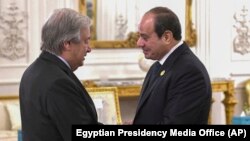As an initial aid convoy of 20 trucks entered the Gaza Strip from Egypt Saturday, Arab and world leaders met in Cairo to discuss how to implement a cease-fire in the 14 day-old conflict between Israel and Hamas.
Attending a peace conference hosted by Egyptian President Abdel Fattah el-Sissi, United Nations Secretary-General Antonio Guterres, who visited Egypt's Rafah Border Crossing with Gaza on Friday, expressed his frustration over the inability to get enough aid to civilians who need it.
"We meet in a region that is in pain and that is one step from the precipice, a region where it is impossible not to be rocked to the core by heart-wrenching, soul-searing images of suffering," said Guterres.
"Yesterday, I went to the Rafah Border Crossing. There I saw a paradox — a humanitarian catastrophe playing out in real time," he said. "On one hand, I saw hundreds of trucks, teeming with food and other essential supplies … full trucks on one side, empty stomachs on the other."
A U.N. aid official estimated that Saturday's 20-truck convoy into the Gaza Strip represents only 3% of the needs of its estimated 2.2 million residents.
Marwan Jilani, a Palestinian Red Crescent official, told Qatar's al-Jazeera TV that aid supplies were being taken to U.N. facilities at Deir al-Balah, near the center of Gaza, for distribution.
A Palestinian journalist sympathetic to Hamas told the TV network the convoy "contained no fuel," while noting Gaza's al-Shifa Hospital — the largest in the strip — "needs it urgently" to run its generators. Al-Shifa is controlled by Hamas.
Meanwhile, at the Cairo conference on Saturday, Jordan's King Abdullah blasted Israel for its treatment of Palestinian civilians and excoriated world leaders for what he claimed was their indifference to Palestinian suffering and double standard regarding international humanitarian law.
"I am outraged and grieved by those acts of violence waged against innocent civilians in Gaza, in the West Bank and in Israel," he said. "The relentless bombing campaign underway in Gaza, as we speak, is cruel and unconscionable on every level. It is collective punishment of a besieged and helpless people. It is a flagrant violation of international humanitarian law."
Several European leaders, including Spain's Pedro Sanchez, said "Israel has the right to defend itself against attacks," referring to Hamas' October 7 attack in Israel, killing Israeli civilians — including women and children — and kidnapping others.
"We strongly condemn the terrorist attacks perpetrated against Israel," said Sanchez "And we also recognize Israel's right to defend itself in strict compliance with international law and international humanitarian law."
The Egyptian president called the conflict in Gaza "an unprecedented crisis that is threatening the peace of the region and the peace of the world."
"We must begin," he said, "by sending aid into Gaza and then move immediately to a cease-fire and finally discuss the setting up of a Palestinian state, side-by-side with Israel."
The Egyptian president insisted he would "not allow Palestinians from Gaza to be pushed into Egypt's Sinai Peninsula "to liquidate" — as he put it — "the 75-year-old Palestinian cause. This is not going to happen, and certainly not at the expense of Egypt."
Palestinian Authority President Mahmoud Abbas reiterated his PLO movement's long-standing position that "violence is the result of the lack of" — what he termed — "a just solution," based on an Israeli and a Palestinian state, living side-by-side.
Palestinians are "not going to leave their land," he said, adding that they "won't go away."





